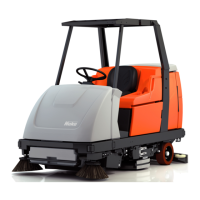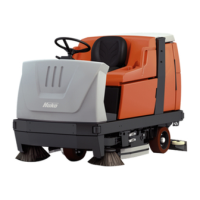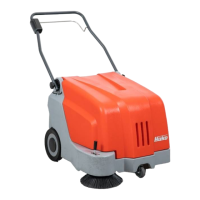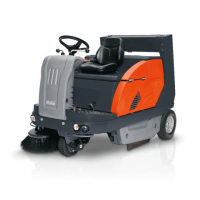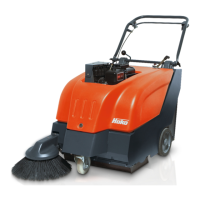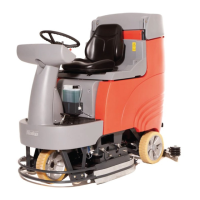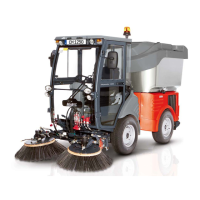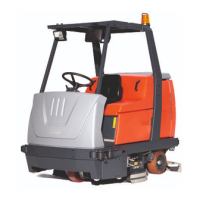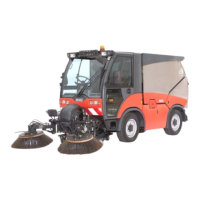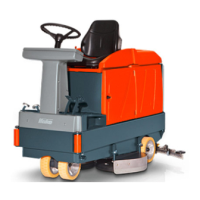Do you have a question about the HAKO Scrubmaster B310 R and is the answer not in the manual?
Details the quality of the vehicle and advises reading the manual for safe operation.
Specifies the proper application of the scrubber drier and defines improper use.
Excludes claims related to failure to observe service/maintenance regulations.
Instructs to inspect for transport damage immediately upon delivery.
Defines symbols used for safety, notes, and ecological hazards in the manual.
Covers compliance with EC directives and safe operation practices.
Provides guidance on initial startup, safe driving, and prohibited uses.
Emphasizes adherence to maintenance schedules and procedures for safety.
Highlights risks associated with electronics, batteries, and traction drive faults.
Details safety precautions for battery handling, charging, and explosion risks.
Advises on handling substances and disposing of cleaning agents.
Identifies safety and warning labels attached to the vehicle.
Specifies the location of the rating plate in the driver's cab.
Illustrates the symbol for selecting drive direction (forward/reverse).
Specifies the maximum permissible water temperature for filling.
Illustrates the solution drainage hose and its function.
Requires initial instruction by an authorized Hako dealer before service.
Details the necessity of initial battery charging for performance and lifespan.
Lists prerequisite tasks before the initial startup of the vehicle.
Provides instructions for fitting and removing brushes or pads.
Step-by-step guide for installing and adjusting the squeegee.
Explains how to adjust the driver's seat for comfort and accessibility.
Outlines essential daily checks before operating the vehicle.
Describes the scrubber drier as a ride-on machine for wet cleaning.
Details the three circular brushes, their adjustment, and deflectors.
Explains the squeegee's function, checks, and automatic raising.
Provides capacity and filling instructions for the fresh water tank.
Details the location, function, and fill level indicator of the waste water tank.
Information on the traction drive motor, speed regulation, and maintenance.
Explains the service brake (hydraulic) and parking brake (mechanical).
Describes the traction battery system, its components, and charging.
Lists and describes optional equipment like working lights and beacons.
Overview of controls and indicators located in the driver's cab.
Details the indicators and buttons for cleaning programs and functions.
Identifies the key switch, horn, and accessory switches on the right panel.
Provides a step-by-step guide for powering on the scrubber drier.
Lists the four available cleaning programs and their activation.
Details the procedure for safely shutting down the machine.
Lists post-operation tasks, including cleaning and battery charging.
Provides an error code table with causes and solutions for system errors.
Lists key dimensions of the scrubber drier, including length, height, and width.
Specifies the working width of the brush head and squeegee.
Indicates the theoretical area coverage rate per hour.
Details dead weight, total operational weight, and transport weight.
Provides specifications for driving speed, climbing capacity, and turning circle.
Lists technical specifications for the brush head and its components.
Specifies power supply, current type, nominal power, and protection class.
States the sound power and sound pressure levels for the vehicle.
Provides weighted effective values for vibration exposure to limbs and body.
Lists order numbers and specifications for optional equipment.
Emphasizes safety and adherence to maintenance for vehicle readiness.
Explains the benefits of Hako system maintenance for operation and costs.
Section for recording handover, test drives, and maintenance activities.
Details daily and weekly maintenance tasks to be performed by the customer.
Tasks for Hako system maintenance I, performed every 250 operating hours.
Tasks for Hako system maintenance II, performed every 500 operating hours.
Annual safety check and maintenance tasks for Hako system III/S.
Overview of the low-maintenance trough battery system and its components.
Procedure and precautions for charging the vehicle's batteries.
Instructions for checking battery acid levels and topping up distilled water.
Step-by-step guide for safely removing the battery trough using lifting gear.
Procedure for safely installing the battery trough into the vehicle.
Guidelines for safe and environmentally sound disposal of used batteries.
Identifies components and access points for the solution tank.
Procedure for filling the solution tank with fresh water and cleaning agent.
Steps for emptying the solution tank when the vehicle is stored.
Instructions for cleaning the solution filter to ensure proper feed.
Identifies components and access points for the recovery tank.
Procedure for emptying and cleaning the recovery tank.
Instructions for cleaning the air intake filter located in the recovery tank.
Information on the scrubbing unit, its disassembly, and brush replacement.
Guidance on checking brush wear and replacing worn brushes.
Procedure for replacing the rubber deflector strips on the squeegee.
Details the squeegee's components and procedures for cleaning and disassembly.
Instructions for changing the sealing strips on the squeegee.
How to adjust support rollers for optimal squeegee contact with the floor.
Information on front wheel service and rear wheel replacement procedures.
Covers red control lamps, error codes, fuses, and drive control relay.
Location and types of fuses within the electronic system.
Guidelines for weekly vehicle cleaning, water disposal, and drying.
Procedures for loading, transporting, and towing the scrubber drier.
| Brand | HAKO |
|---|---|
| Model | Scrubmaster B310 R |
| Category | Floor Machine |
| Language | English |
